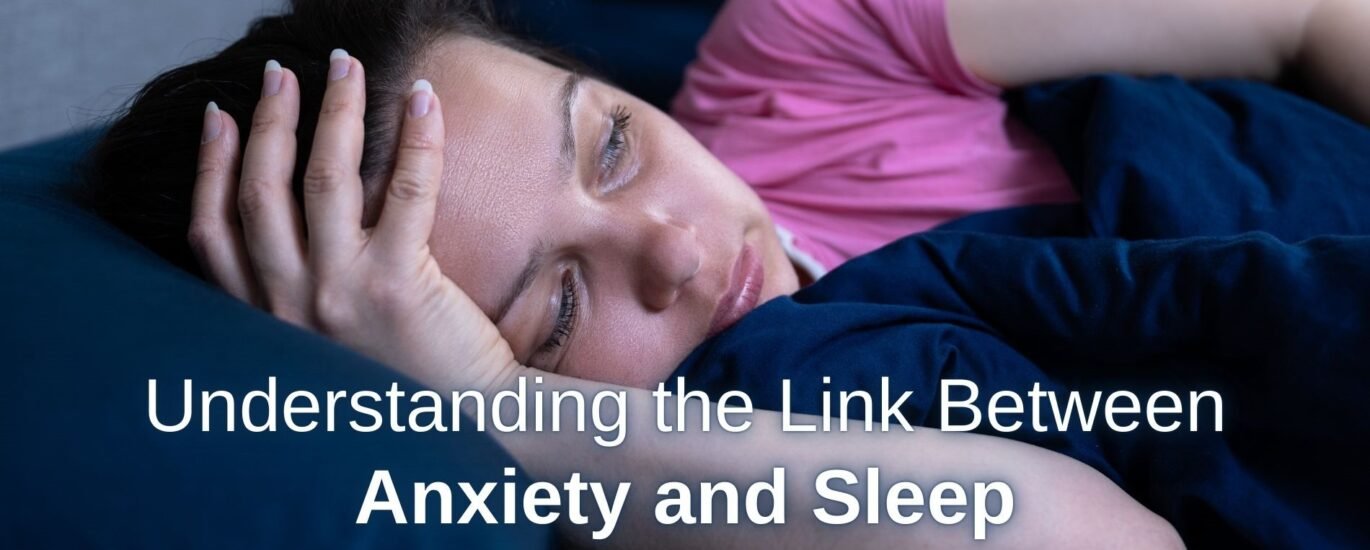The Link Between Anxiety and Sleep: Tips for Restful Nights
Anxiety and sleep interact with each other in a complex, intertwining way: each can have significant effects on the other. Anxiety, not infrequently, stands in the way of a night of decent sleep; the reverse is also true, with the lack of proper sleep can exacerbate worries and stress. This cycle can be very frustrating, leaving you utterly exhausted, bad-tempered, and mentally befogged. Understanding the link between anxiety and sleep—and knowing how to break that cycle—can help you improve not only your mental health but also your physical one. Here’s how anxiety is connected to sleep and some practical tips to help you get the restful nights you deserve.
How Anxiety Affects Sleep

Anxiety isn’t just limited to affecting your mood and mental well-being; it can also deeply impact your sleep quality. Here’s how:
1.Racing Thoughts: An anxious mind races constantly, making it even more difficult to quiet your thoughts at bedtime. Work worries and relationship issues can keep you awake long into the night with racing thoughts. This mental chatter can delay your ability to fall asleep as well as prevent you from reaching the deep, restorative sleep that’s so needed.
2.Physical Symptoms of Anxiety: The body’s “fight or flight” response from anxiety causes physical symptoms in an increased rate of heartbeats, and the individual breathes very shallowly, with a muscular tenseness and overall restlessness, which makes the person restless and unable to relax enough to sleep.
3.Nightmares and Sleep Interruptions: Anxiety may also make you tend to nightmares or vivid dreams that further can disrupt sleep. Maybe you fall into a state of sleep but wake up anxious or tired.
4.Insomnia: Anxiety can cause insomnia. In this condition, it is hard to fall asleep or stay asleep for a long time. Sometimes the cycle becomes vicious because worrying about not having a good night’s sleep raises the anxiety level of the individual, making it still more difficult to sleep.
Effect of Poor Sleep on Anxiety

Anxiety disrupts sleep, but poor sleep also increases the level of anxiety. When you don’t get enough quality sleep, your brain becomes less able to regulate emotions and deal with stress. Sleep deprivation affects the prefrontal cortex, the part of the brain responsible for decision-making and emotional regulation, making you more vulnerable to heightened anxiety. In a vicious cycle that goes on for quite some time, a lack of rest will lead to anxiety not sleeping, thus increase in anxiety from poor sleep.
Breaking the Cycle: Tips for Restful Nights

If you struggle with both anxiety and lousy sleep, you need to take a step forward from the cycle. Here are some practical tips to help manage anxiety and improve your sleep quality:
1.Create a Calming Bedtime Routine: Create a soothing pre-sleep routine that tells your body it’s time to relax. For example, reading a good book, a warm bath, gentle yoga, or soft sounds of music. Steer clear of watching dramatic television programs or play with your phone, as the blue light will disrupt your production of melatonin, making it difficult to fall asleep.
2.Relaxation Techniques: Deep breathing exercises, progressive muscle relaxation, and mindfulness meditation are excellent tools for calming the body and mind. These techniques can reduce the physical symptoms of anxiety, lower your heart rate, and bring about a sense of calm, making it easier to drift off to sleep.
Try this:
One of the simple and effective methods to relax your nervous system is this 4-7-8 breathing technique. Inhale quietly through your nose for a count of 4, hold your breath for a count of 7, and then exhale completely through your mouth for a count of 8. Do this for a few cycles until you relax and unclench.
3.Limit Caffeine and Alcohol: Caffeine and alcohol are both common sleep disruptors. Caffeine is a stimulant that can stay in your system for hours, preventing you from falling asleep. Alcohol, while initially relaxing, can disrupt the latter stages of your sleep cycle, leading to poor-quality rest. Try to limit these substances, especially in the afternoon and evening.
4.Maintain an Unwavering Sleep Schedule: Going to bed and waking up at a consistent time every single day, even on weekends, can maintain an internal clock for the body. A consistent sleep schedule trains your brain to expect rest at certain times, making it easier to fall asleep and wake up naturally.
5.Create a sleep-friendly environment. Your sleep environment is playing a huge role in the quality of your rest. Make your bedroom very comfortable and cozy. This might be about adjusting room temperature, minimizing noise and light, and investing in a good mattress and pillows. Then, you might find it easier to sleep inside the place when it’s a more calming environment.
6.Address Worries During the Day. If worries and racing thoughts disturb you at night, managing those worries during the day can help. Consider writing down your worries in a journal and brainstorming some solutions. Clearing your head in this manner should prevent those worries from sneaking in when it’s time for sleep.
7.Professional help should be sought if anxiety or sleep disturbances interfere with daily activities. Two highly effective treatments available include cognitive-behavioral therapy for insomnia (CBT-I) and cognitive-behavioral therapy for anxiety (CBT). A therapist will delve into the cause of your anxiety and instruct you on coping mechanisms that might be used to treat both anxiety and sleep disorders.

Final Thoughts: Prioritize Your Mental and Physical Health
Anxiety and sleep are complexly related; it can get tough to break the cycle. But, the right strategies will break the cycle again and bring control over sleep and mental health back to you. Do not forget that mindfulness, exercise, and proper sleep hygiene all help in achieving desirable self-care practices. As such, taking small actions towards managing anxiety and promoting sleep can greatly improve the quality of well-being and overall restfulness and relaxation over one’s daily life.
To know more about insomnia and anxiety Click here.
More articles to read: https://medplusmarts.com/the-science-behind-anxiety-how-it-affects-your-brain-and-body/





